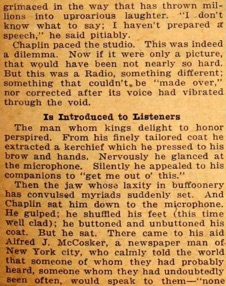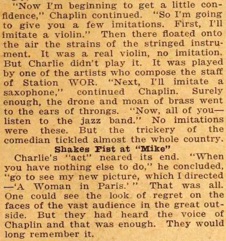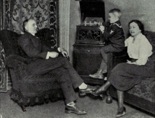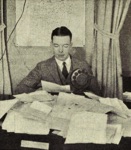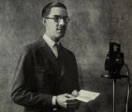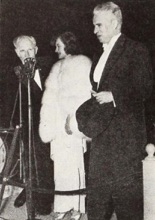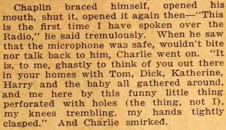The Gold Rush 1924 1925 1926 next previous
The Gold Rush Clippings 45/363
Radio Digest, Chicago, October 27, 1923.
Robert A. Munn In addition to being an announcer at station
WGR, Buffalo, Mr. Munn, who is an accomplished
musician, is frequently heard as organist from that station,
and he could also present an excellent program
of baritone solos if he desired. He is the lone bachelor of the
WGR, but doesn‘t look at all worried about it.
(...) Radio Broadcast, Garden City, N. Y., July 1924
& The „Wave From Lake Erie“ He rolls in from
WJAX, the Union Trust Company‘s station in Cleveland.
In private life, the „wave“ is E. G. Johnson. He has
a deep bass voice which, it is reported, knocks ‘em dead
all the way from Atlantic City to the Mississippi
and from Nova Scotia to Cuba.
(...) Radio Broadcast, Garden City, N. Y., March 1923
& Paulette Goddard and Charlie Chaplin say
a few words into the „mike“ at the premiere of Modern Times.
(...) Modern Screen, May 1936
& A Family Party Some boys get the radio fever
when very young.
(...) Radio Broadcast, Garden City, N. Y., Sept. 1922, detail
„Did I talk sense to that thing?“
Editorial content. „Charlie Chaplin .Acts‘
Comedy King Afraid When First On Air
Famous Film Actor Puts Humor into Talk for Ether Audience
Imitates Jazz Band
Quails before Microphone That Takes Message
to Thousands but Recovers Confidence
Newark, N. J. – Some one long ago said something to the
effect that if he could write the songs of a nation he would
not care who wrote its laws.“ (...)
„Chaplin Imitates A Jazz Band – Not
,Quite An Ordeal,‘ Says Broadcaster Chaplin
Comedian Puts One Over on Fans in Address at WOR –
His First Radio Talk“ (...)
„With the comic film he has girdled the globe and with
Radio here recently he, for the first time in his career,
hurled his humor through the ether. Even the Radio waves
curled in delight as they eagerly hurried onward
to bring fun to eager thousands.
Charlie Fears Ordeal
The man who, as a juggler and make believe drunkard,
faced critical audiences; the man who afterward appeared on the
silver screen before millions, the man whose vocation
as actor and director required unusual poise, was visibly
agitated as he made ready in the studio of Station
WOR to speak into the microphone.
It was not without much patience and diplomacy that the
famed mimic was finally induced to face what he termed
,that funny little thing.‘ It was one thing to ,cut didoes‘ before
a camera; it was another, a far more exacting thing,
to talk through a ,dojigger‘ of metal to an unseen audience
miles away.
Chaplin approached the microphone gingerly. ,This is quite
an ordeal, you know,‘ he volunteered to J. M. Barnett,
director of WOR. ,You have to use your imagination so much.‘
As if a Chapin would find it hard to imagine!
Can‘t Remake Broadcast
,You can face the camera,‘ the noted comedian continued,
,knowing that if you make a mistake, if you slip up, you
can try again; you can make over the picture. But think of all
the thousands of people but there in the world hanging
onto every word I say.‘ Charlie mopped his brow and grimaced
in the way that has thrown millions into uproarious
laughter. ,I don‘t know what to say; I haven‘t prepared a speech,‘
he said pitiably.
Chaplin paced the studio. This was indeed a dilemma.
Now if it were only a picture, that would have been not nearly
so hard. But this was a Radio, something different;
something that couldn‘t be ,made over,‘ nor corrected after
its voice had vibrated through the void.
Is Introduced to Listeners
The man whom kings delight to honor perspired.
From his finely tailored coat he extracted a kerchief which he
pressed to his brow and hands. Nervously he glanced
at the microphone. Silently he appealed to his companions
to ,get me out o‘ this.‘
Then the jaw whose laxity is buffoonery has convulsed
myriads suddenly set. And Chaplin sat him down
to the microphone. He gulped; he shuffled his feet (this time
well clad); he buttoned and unbuttoned his coat.
But he sat. There came to his aid Alfred J. McCosker,
a newspaper man of New York City, who calmly
told the world that someone of whom they had probably heard,
someone whom they had undoubtedly seen often,
would speak to them – ,none other than Charlie Chaplin
himself, in person.‘
His First Time Before Microphone
The poor little, rich little man squirmed. He, like those
around him, could see hundreds of thousands of men
and women and boys and girls, the mighty and the lowly, grin
and then grin again. ,Charlie Chaplin – think of it!‘
Why, the night itself seemed to hesitate, to anticipate!
Chaplin braced himself, opened his mouth,
shut it, opened it again then – ,This is the first time I have
spoken over the Radio,‘ he said tremulously. When
he saw that the microphone was safe, wouldn‘t bite nor talk
back to him, Charlie went on. ,It is, to me, ghastly
to think of you out there in your homes with Tom, Dick,
Katherine, Harry and the baby all gathered around,
and me here by this funny little thing perforated with holes
(the thing, not I), my knees trembling, my hands
tightly clasped.‘ And Charlie smirked.
,Imitated‘ Full Jazz Band
,I feel like the young actor whose only line was, ,There
is a man downstairs who calls himself Solomon Isaacs.‘
As the young actor was pushed onto the stage he managed
to splutter something that sounded like Si-mol-ix.‘
The greatest of ‘em all turned in his chair and nodded first
inquiringly, then confidently.
,Now I‘m beginning to get a little confidence,‘ Chaplin
continued. ,So I‘m going to give you a few imitations.
First, I‘ll imitate a violin.‘ Then there floated onto the air the
strains of the stringed instrument. It was a real violin,
no imitation. But Charlie didn‘t play it. It was played by one
of the artists who compose the staff of Station WOR.
,Next, I‘ll imitate a saxophone,‘ continued Chaplin. Surely
enough, the drone and moan of brass went to the
ears of throngs. ,Now, all of you – listen to the jazz band.‘
No imitations were these. But the trickery of the
comedian tickled almost the whole country.
Shakes Fist at ,Mike‘
Charlie‘s ,act‘ neared its end. ,When you have nothing
else to do,‘ he concluded, ,go to see my new picture,
which I directed – A Woman of Paris.‘ That was all. One
could see the look of regret on the faces of the vast
audience in the great outside. But they had heard the voice
of Chaplin and that was enough. They would long
remember it.
As Charlie left the studio he asked anxiously: ,Did
I talk sense to that thing?‘ Then he shook his fist
at the microphone, grinned the grin that has earned him
a fortune, and went on his way.
But before he passed personally out of the lives of
those in the studio and station. Chaplin declared
enthusiastically that he owned a Radio set and that he
listened in often to the program.“
More about WOR see Motion Picture News.
March 1, 1924.
Redaktioneller Inhalt
The Gold Rush 1924 1925 1926 next previous

